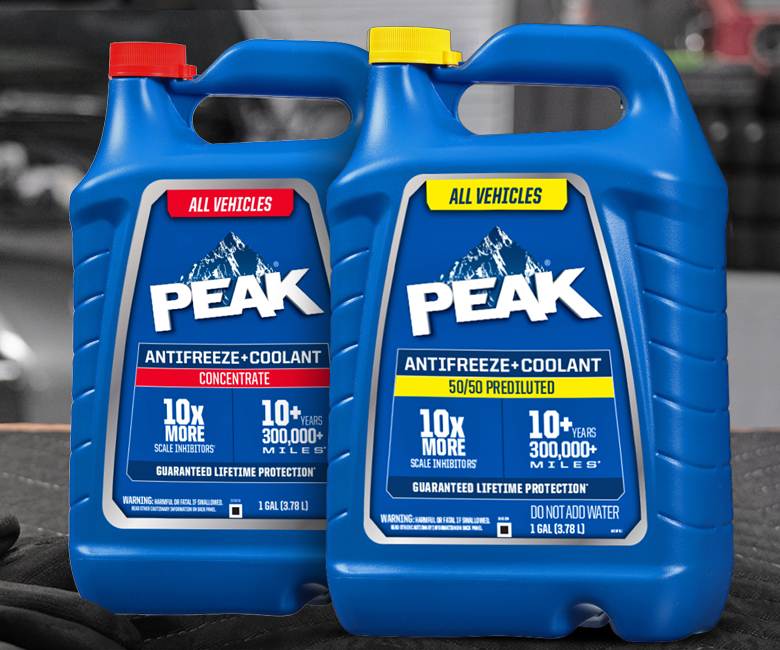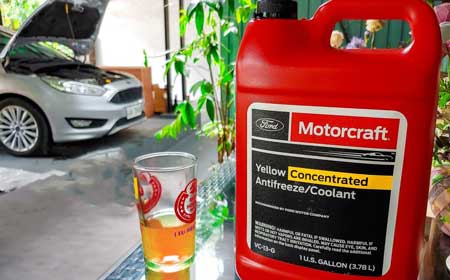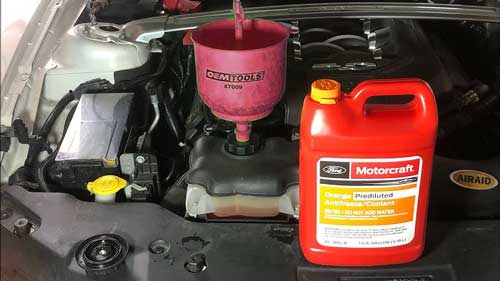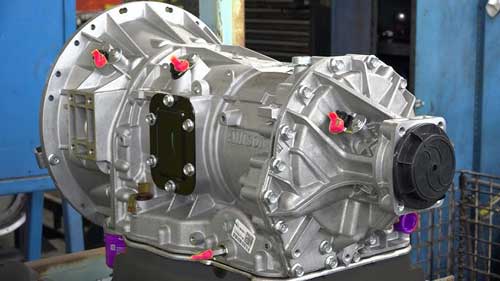Can I Mix 50/50 Coolant With Concentrate? Find Out Now.

Yes, you can mix 50/50 coolant with concentrate, but make sure to follow the manufacturer’s instructions for proper dilution ratios. When mixing coolant, it’s important to remember that the concentration level impacts the performance and longevity of your engine’s cooling system.
A 50/50 mix of coolant and water is often recommended for most vehicles, and adding concentrate ensures that the coolant’s freeze and boil points are optimized. It’s important to avoid over-diluting the mixture, as too much water can lead to corrosion and other cooling system issues.
- Locate the coolant reservoir under the hood of your vehicle
- The reservoir is usually translucent so you can see the level of coolant inside
- Remove the cap from the reservoir and pour in half a gallon of distilled water
- Add one pint of 50/50 coolant concentrate to the reservoir
- Replace the cap on the reservoir and shake it gently to mix everything together
- Check under your vehicle for any leaks before starting it up again
In this article, we’ll dive into the ins and outs of mixing coolant and provide some helpful tips for maintaining your vehicle’s engine cooling system.

Credit: www.amazon.com
What Is Coolant?
Coolant is a crucial component that helps to regulate the temperature of your vehicle’s engine. It is a liquid substance that flows through the engine and absorbs heat. As it travels through the engine, it picks up heat and carries it away to the radiator where it is dissipated.
Explanation Of Coolant
Coolant, also known as antifreeze, is a liquid that is typically mixed with water to regulate the engine’s temperature. Coolant is essential for ensuring that your engine doesn’t overheat during operation. It does this by absorbing the heat generated by the engine when it is running and carrying it away to the radiator where it is cooled down.
The primary function of coolant is to prevent your engine from overheating as this can cause significant damage to the engine components. Coolant also prevents the engine from freezing during the cold winter months by keeping it at a consistent temperature.
It is made up of various chemicals and additives that enhance its performance, including ethylene glycol or propylene glycol, which are the primary ingredients.
Types Of Coolant Available
There are two main types of coolant available, namely:
- Inorganic acid technology (iat) coolant: This type of coolant is typically green in color and contains silicates as corrosion inhibitors. It is often used in older model vehicles and is not recommended for use in modern engines as it is not environment-friendly.
- Organic acid technology (oat) coolant: This type of coolant is typically orange in color and does not contain silicates as corrosion inhibitors. It is often used in newer vehicles and is more environmentally friendly than iat coolant.
When selecting a coolant, it is important to check your vehicle’s owner manual to ensure that you are using the recommended type.
Importance Of Cooling Systems In Vehicles
The cooling system is a crucial component of your vehicle as it regulates the engine’s temperature during operation. Without a functioning cooling system, the engine can overheat, leading to significant damage and potentially expensive repairs. The cooling system is made up of various components, including the radiator, water pump, thermostat, and fan.
Modern engines generate a lot of heat during operation, and the cooling system is responsible for absorbing this heat and carrying it away to the radiator, where it is dissipated. The cooling system plays a critical role in ensuring that your engine operates at the correct temperature and that it doesn’t overheat or freeze.
How Coolant Works To Regulate Temperature In Your Vehicle
The coolant flows through your engine, absorbs heat, and carries it away to the radiator, where it is cooled down. The process begins with the water pump, which pumps the coolant through the engine and into the radiator. The coolant absorbs heat from the engine and carries it away to the radiator, where it is cooled down by the airflow.
Once the coolant has been cooled down, it flows back into the engine, and the process repeats.
Coolant works by absorbing heat and carrying it away from the engine, ensuring that it operates at the correct temperature. It is essential to maintain your vehicle’s cooling system to ensure that it functions correctly and that the coolant can do its job effectively.
Regular maintenance, including checking the coolant level and ensuring that the system is free from leaks, is critical to your vehicle’s longevity.
Coolant plays a critical role in ensuring that your vehicle’s engine operates at the correct temperature. It works by absorbing heat and carrying it away to the radiator where it is cooled down. There are two main types of coolant available, and it is important to use the right one for your vehicle.
Regular maintenance is essential to ensure that your cooling system functions correctly and that your engine doesn’t overheat.
Understanding The Different Types Of Coolant
Coolant is an essential component in keeping your car’s engine running smoothly, especially during hot weather conditions. However, not all coolants are created equal. Available on the market is vital in protecting your vehicle’s engine and maintaining its optimal performance.
Overview Of The Various Coolant Types (Concentrate, 50/50, Etc.)
Coolant comes in two main types: concentrate and 50/50. Concentrate coolant is the purest form of coolant, made up of 100% ethylene glycol, while 50/50 coolant is a pre-mixed combination of half distilled water and half concentrate coolant. There’s also organic acid technology (oat) coolant, which is a newer type of coolant that uses organic acids instead of inorganic chemicals to prevent corrosion.
Pros And Cons Of Different Types Of Coolant
- Concentrate coolant provides better cooling due to its 100% ethylene glycol content. It also has longer shelf life and is cheaper per gallon.
- However, concentrate coolant requires more work to mix with distilled water and should be handled with care as it can be toxic. Also, it needs to be changed more often compared to 50/50 coolant.
- 50/50 coolant is more convenient as it is pre-mixed and ready to use. It’s also less toxic and easier to handle than concentrate coolant.
- However, it’s more expensive per gallon, and it might not offer as much cooling power as concentrate coolant.
Recommendations On Which Types Of Coolant Are Best For Specific Vehicles
Choosing the right coolant for your vehicle depends on the make, model, and year of your car. It’s crucial to read your owner’s manual and consult with a certified mechanic to determine the ideal coolant type for your vehicle.
For example, some late-model cars require the use of oat coolant, while others require traditional concentrate or 50/50 coolant. Additionally, some older-model cars may require coolant with specific additives to prevent corrosion.
Factors That Determine Which Type Of Coolant Is Ideal For Your Vehicle
Several factors determine which coolant type is best suited for your car. These include:
- The make and model of your vehicle
- The age of your car
- The weather conditions in your area
- The frequency of coolant changes needed
- The type of engine in your vehicle
Consulting with a mechanic or a trusted auto center can help you determine which coolant type is ideal for your car to prevent engine damage and prolong its lifespan.
By understanding the different types of coolant, their advantages and disadvantages, and which one is right for your vehicle, you can make an informed decision that keeps your car running smoothly, even during extreme weather conditions.
Coolant is one of the most critical fluids in your vehicle’s engine. It is responsible for maintaining a consistent temperature throughout the engine block, and over time, it can break down and become less effective. This can lead to serious engine problems.
What Happens If You Mix 50/50 Coolant With Concentrate?
One of the common questions car owners ask is whether they can mix 50/50 coolant with concentrate. Mixing coolants can have a significant impact on your engine’s performance, and it’s essential to know what happens when you mix these two types of coolants.
When you mix a 50/50 coolant with concentrate, it dilutes the concentrate, reducing its effectiveness. This means that the cooling system will not work as efficiently as it would if you used a single type of coolant. As a result, your engine may overheat, leading to damage to other components.
Why Mixing Coolant Types Isn’T Always Recommended
Mixing coolant types is not always recommended for several reasons:
- Chemical reactions between different types of coolants can cause blockages in the engine, leading to cooling system failure.
- Different coolants have different boiling points, and their mixing can cause the coolant to boil too quickly, leading to engine damage.
- Mixing coolants can affect the lubricating properties of the coolant, leading to problems with the water pump and other components.
Explanation Of Coolant Ratios And Why They Matter
Coolant ratios are crucial to maintaining engine health. The ratio of coolant to water is usually around 50/50, but this can vary depending on the coolant type. The coolant ratio affects the boiling and freezing points of the fluid, as well as its lubricating properties.
When deciding on a coolant ratio, it’s essential to stick to the manufacturer’s recommendations. Using too much coolant or water can lead to engine damage, while using too little can lead to overheating.
Advantages And Disadvantages Of Mixing Coolant Types
Mixing coolant types does have some advantages, such as:
- It can help to top up a low coolant level.
- It is often cheaper than buying new coolant.
However, mixing coolant types also has several disadvantages, such as:
- It can lead to engine damage and failure.
- It reduces the effectiveness of the coolant and can lead to engine overheating.
- It can lead to blockages in the engine, causing further cooling system failures.
Mixing 50/50 coolant with concentrate is not recommended due to its negative impact on engine performance. Stick to the manufacturer’s recommendations for coolant ratios and avoid mixing different types of coolants. This will help you maintain the health of your engine and prevent costly repairs in the future.
Mixing Coolant – How To Do It Right
Maintaining your vehicle’s cooling system is one of the essential ways to keep your car running smoothly. Coolant helps regulate engine temperature and prevent it from overheating, extending the life of your vehicle’s engine. If you’re wondering whether you can mix 50/50 coolant with concentrate, the answer is yes.
However, it’s critical to get the mixture right.
Step By Step Guide On How To Mix Coolant
- Check your vehicle owner’s manual to find out the recommended coolant type and its mixing ratio.
- Purchase the correct type of coolant for your vehicle if you don’t have it already.
- In a clean and empty container, pour the exact amount of coolant concentrate required into the container. (remember to mix the coolant concentrate with the recommended amount of distilled water)
- Add half of the recommended amount of distilled water to the coolant concentrate already in the container.
- Stir the mixture thoroughly to ensure it’s well mixed.
- Now, add the remaining distilled water to the mixture and stir.
- Ensure that the coolant is correctly mixed before pouring it into your vehicle’s cooling system.
Safety Precautions To Take When Mixing Coolant
Coolant contains harmful chemicals that can pose a danger to your health, so it’s crucial to take the necessary precautions when mixing it. Here are some recommended safety measures:
- Wear protective gloves and goggles when working with coolant.
- Ensure that you mix coolant in a well-ventilated area to avoid inhaling harmful fumes.
- Keep coolant out of the reach of children and pets.
- Dispose of the coolant in a manner recommended by your local authorities.
Tips On How To Effectively Mix Coolant For Your Vehicle Type
To achieve proper mixing of coolant, follow these tips:
- Only use distilled water when mixing coolant.
- Ensure that the container used to mix the coolant is clean and free of debris.
- Mix the coolant in the recommended ratio as indicated in your vehicle manufacturer’s manual.
- Opt for a high-quality coolant concentrate to ensure optimal performance.
Common Mistakes To Avoid When Mixing Coolant
When mixing coolant, it’s essential to avoid these common mistakes:
- Failing to mix the coolant in the correct ratio. This can cause engine damage, overheating or ineffective cooling.
- Using non-distilled water to mix with your coolant concentrate. Regular water may contain minerals that can cause corrosion in your cooling system and reduce your coolant’s effectiveness.
- Pouring the coolant concentrate directly into your vehicle’s cooling system without mixing with distilled water first.
Mixing coolant correctly for your vehicle type is vital to ensure it remains well maintained, and the engine performs optimally. By following this guide, taking the necessary safety precautions, and avoiding common mistakes, you’ll have no trouble mixing your coolant correctly.
Concentrate Vs 50/50 Coolant
One of the most common questions we get asked here at Cool-It is what kind of coolant should I use? The two most common types of coolant are Concentrate and 50/50. So, which one is best for your car?
Concentrate coolant is typically used in new cars or if you are topping up your coolant levels. It needs to be diluted with water before it can be used. The advantage of using concentrate is that it lasts longer and provides better protection against corrosion and overheating.
50/50 coolant is a mix of water and antifreeze. It’s ready to use straight out of the bottle and doesn’t need to be diluted. 50/50 coolant is usually cheaper than concentrate, but it doesn’t last as long and isn’t as effective at protecting against corrosion and overheating.
What Happens If You Don’T Dilute Coolant
If you don’t dilute coolant, it will become less effective at cooling your engine. Coolant contains water and antifreeze, and the ratio of these two ingredients is important for proper engine cooling. If the coolant becomes too concentrated, it won’t be able to absorb enough heat from the engine and the engine will overheat.
Additionally, undiluted coolant can freeze in cold weather, which can cause serious damage to your engine.
How to Mix Coolant Concentrate
If you’re like most people, you probably don’t think much about your car’s coolant system. But if you want your engine to run smoothly and efficiently, it’s important to keep the system clean and properly mixed. That means knowing how to mix coolant concentrate with water.
The first step is to identify the type of coolant concentrate that’s compatible with your car. There are many different types on the market, so it’s important to read the label carefully before making a purchase. Once you’ve got the right product, measure out the amount of water needed according to the manufacturer’s instructions.
Next, slowly add the coolant concentrate to the water while stirring gently. It’s important not to add too much at once or you’ll risk damaging your engine. Once all of the concentrate has been added, replace any caps or lids and give the mixture a final stir.
Now it’s time to test drive your car and make sure everything is working properly. If all goes well, enjoy peace of mind knowing that your engine is protected against overheating!
How to Mix 50/50 Coolant
It’s important to keep your car engine cool, especially during hot summer months. One way to do this is by mixing 50/50 coolant and water in the radiator. Here’s a step-by-step guide on how to do this:
- Locate the radiator cap and unscrew it. 2. Pour half a gallon of distilled water into the radiator. 3. Add one gallon of 50/50 coolant mix to the radiator.
You can find this at most auto parts stores. 4. Screw the radiator cap back on tight.
What Can Happen If the Coolant is Not Strong Enough
If the coolant in your car is not strong enough, a number of things can happen. The most likely scenario is that your engine will overheat. This can damage the engine and lead to costly repairs.
In extreme cases, an overheated engine can seize up, which can cause irreparable damage. Another possibility is that the radiator will become clogged with debris and scale if the coolant is not strong enough. This will reduce the efficiency of the radiator and make it more difficult for the engine to stay cool.
If left unchecked, a clogged radiator can eventually lead to engine failure. It’s important to make sure that the coolant in your car is at the correct level and strength. Check it regularly and top it up as needed.
Concentrate Vs Premix Coolant
When it comes to coolant, there are two main types: concentrate and premix. So, what’s the difference between the two? Concentrate coolant is made up of water and antifreeze, with the latter making up about 60-70% of the solution.
This type of coolant needs to be diluted with water before use. Premix coolant, on the other hand, is a pre-diluted solution that’s ready to use straight out of the container – no need to add any additional water.
50/50 Coolant Mix Freezing Point
As the name suggests, a 50/50 coolant mix is made up of 50% water and 50% antifreeze.
The advantage of using a 50/50 mix is that it lowers the freezing point of the water, which can help prevent your engine from overheating in winter weather. However, it’s important to note that a 50/50 mix will also raise the boiling point of the water, which means that it can actually cause your engine to overheat if used in hot summer weather. So, what’s the verdict?
If you live in an area with cold winters and hot summers, it’s probably best to stick with just water during the summer months and switch to a 50/50 mix when winter rolls around. But if you live in an area with milder weather year-round, a 50/50 mix should work well for you all year long.
Frequently Asked Questions For Can I Mix 50/50 Coolant With Concentrate
Can I Mix 50/50 Coolant With Concentrate?
Yes, you can mix 50/50 coolant with concentrate. Simply use equal parts coolant and water to create a 50/50 mix. Then add the same amount of coolant concentrate and mix well.
Is It Safe To Mix Different Types Of Coolant?
No, it’s not recommended to mix different types of coolant. Mixing different coolants can cause chemical reactions that lead to reduced performance, corrosion, and damage to your engine.
How Often Should I Replace My Coolant?
Coolant should be replaced every two to five years, or according to your vehicle manufacturer’s recommended maintenance schedule. It’s important to follow this schedule to prevent any damage to your engine.
What Happens If I Use Too Much Coolant Concentrate?
If you use too much coolant concentrate, it can reduce the effectiveness of the product and may even harm your engine. Always follow the recommended mixing ratio when adding coolant concentrate to your coolant mix.
Can I Use Water Instead Of Coolant?
While you can use water instead of coolant in a pinch, it’s not recommended for extended use. Coolant contains chemicals that help prevent corrosion and overheating. It’s important to use coolant as recommended by your vehicle manufacturer.
Conclusion
So, after discussing the benefits and drawbacks of mixing 50/50 coolant with concentration, we can conclude that it is possible to mix them, but it is recommended to avoid it. Mixing the two can dilute the coolant’s anti-freeze properties and reduce its effectiveness.
As a result, the engine may overheat or freeze in extreme weather conditions, causing serious damage to your vehicle’s engine. If you do need to mix them, it’s essential to add distilled water to balance the coolant concentration and ensure the radiator’s adequate performance.
It’s always best to follow the manufacturer’s recommended guidelines and use the same type of coolant. By doing so, you will prolong the life of your engine, minimize repair expenses, and avoid potential accidents on the road. So, take care of your vehicle and consult a professional mechanic if you aren’t sure about what coolant type is best for your car.


